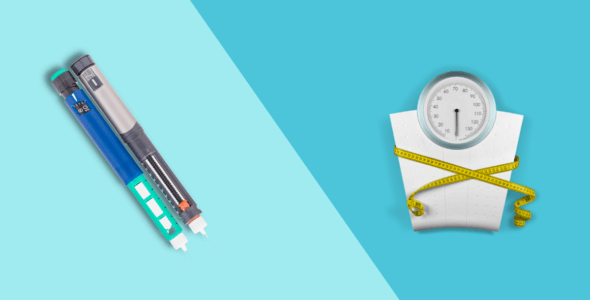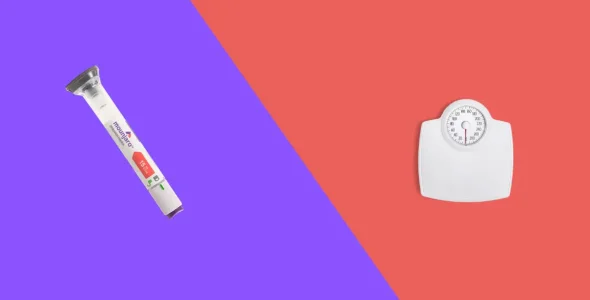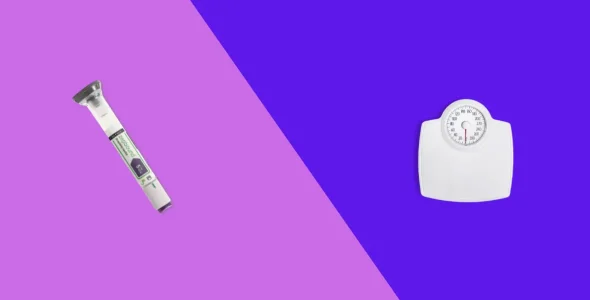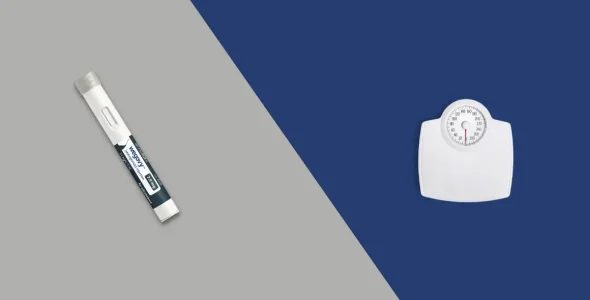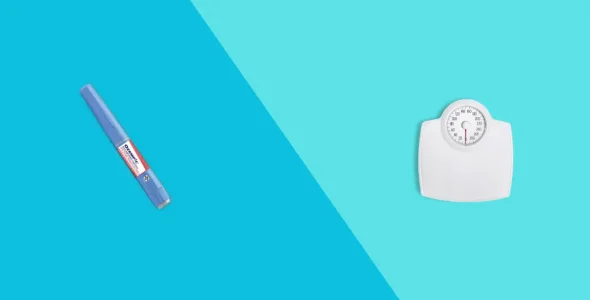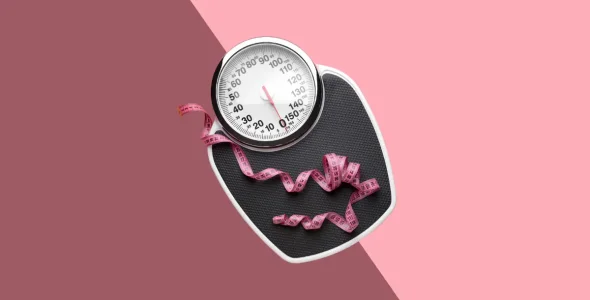Does diarrhea cause weight loss? Risks and causes
Have you ever had diarrhea and noticed a dip on the scale? While it might seem like a quick fix, the weight loss you see is usually just from a loss of fluids (dehydration), and it's important to understand what’s happening in your body.
Key highlights
- Diarrhea is common and usually causes inconvenience and discomfort, but if it's severe, it can be risky for your health.
- Weight loss from diarrhea that lasts more than two weeks isn't a good thing. The weight loss you see after a couple of days of diarrhea is mostly from losing fluids (dehydration) and not from losing fat.
- Diarrhea can be caused by infections, digestive conditions, food intolerances, medications, and more.
- Prolonged diarrhea can lead to dehydration, nutritional deficiencies, and electrolyte imbalances.
- Seek medical attention if diarrhea lasts more than a few days, causes significant weight loss, or is accompanied by symptoms like blood in stools, severe pain, or fever.
Acute diarrhea is the second most common illness in the U.S. and causes frequent, watery stools, which usually go away on their own after a few days.
If severe, it can be dangerous due to the dehydration it causes and may also cause other serious risks to your health. According to the World Health Organization (WHO), diarrhea is the fifth leading cause of death in low-income countries and the second leading cause of death in children under five.
Many people assume that diarrhea leads to real weight loss, but the truth is that most of the weight loss is just water from losing fluids and eating less while feeling sick. It’s temporary weight loss and doesn’t reflect fat loss or a healthy way to shed pounds.
Once you’re back to eating and drinking normally, your weight should return to normal. Diarrhea doesn’t make you lose body fat.
Discover the truth about diarrhea and weight loss. Learn why diarrhea may cause temporary weight loss and when it’s a sign of a more serious health concern.
What is diarrhea?
Diarrhea is when you have frequent (three or more) loose or watery stools a day or more than usual, often called gastroenteritis by medical professionals. Loose stools can be accompanied by urgent bowel movements or even accidental leaks. If it continues, it may lead to weight loss.
Common causes of diarrhea include:
- Bacteria and viruses
- Digestive health conditions (irritable bowel syndrome, Crohn’s disease, ulcerative colitis)
- Food intolerances
- Artificial sweeteners
- Side effects of certain medications (antidepressants, antacids, cancer medications)
- Malnutrition/malabsorption
- Overuse of constipation relievers/laxatives
Diarrhea can be acute, persistent, or chronic:
Acute diarrhea
Acute or short-term diarrhea, also known as acute gastroenteritis, is often caused by infections like bacteria or viruses. It usually lasts 1-2 days and goes away on its own. If you feel you lost a little weight after it’s gone, it’s probably because you lost fluids your body normally holds, and you didn’t eat as much because you were sick. Once you start drinking and eating normally again, your weight should return to normal. Diarrhea doesn’t make you lose body fat.
Acute diarrhea is often caused by viral infections like norovirus or bacteria like Salmonella or E. coli, which is often linked to food poisoning. It can also happen if you change your diet or eat foods with artificial sugar substitutes like sorbitol or xylitol.
Persistent diarrhea
Persistent diarrhea lasts more than 2-4 weeks. It can be caused by infections that don’t go away, certain medical conditions like irritable bowel syndrome or celiac disease, or side effects from certain medications.
Unlike short-term diarrhea, which usually clears up quickly, persistent diarrhea needs medical attention to find and treat the cause. If you have it, you should see a doctor for advice and treatment.
Chronic diarrhea
Chronic diarrhea lasts a long time, usually more than 4 weeks. Chronic diarrhea can be caused by parasitic infection, fat malabsorption, and impaired digestion. It can also be caused by ongoing health problems like inflammatory bowel disease (IBD), celiac disease, or problems with how the digestive system works.
About 5% of people experience chronic diarrhea at any given time. Chronic diarrhea needs medical care to figure out what’s causing it and how to treat it. If you have it, you should see a doctor to manage the condition.
Diarrhea and weight loss
Diarrhea can cause weight loss, but it’s temporary and mainly due to fluid loss from your body.
When you have diarrhea, your body loses a lot of water and salt, which can make the scale show a lower number. But this is not actual fat loss, and once you’re rehydrated and back to normal, the weight will come back.
Don’t rely on diarrhea for weight loss. It’s not healthy and can lead to dehydration and other health issues. Focus on proper nutrition and hydration rather than weight loss through this unhealthy method.
Diarrhea can cause temporary weight loss due to:
Loss of fluids
Diarrhea causes the loss of water and fluids from your body, which shows up as weight loss. It can also come with nausea, vomiting, bloating, or loss of appetite, so you can’t eat and drink, which leads to more weight loss.
The amount of weight lost depends on how long the diarrhea lasts and how bad the symptoms are. But most of the weight lost is water weight and will come back once your bowel movements and appetite return to normal.
A healthy adult need not worry about short-term diarrhea, but if it lasts longer, you can lose fluids, which can harm your kidneys and cause heart problems and muscle cramps.
Reduced food intake
When you have diarrhea, you often eat less because you might not feel hungry or may be too uncomfortable to eat. This further contributes to temporary weight loss.
Diarrhea can also interfere with how your gut absorbs nutrients, meaning your body doesn’t get all the calories and vitamins it needs.
If diarrhea lasts for a while, it can create a calorie deficit, where you’re not getting enough energy from food.
People usually eat less when they have diarrhea because they feel nauseous, are worried about worsening symptoms, or just don’t feel like eating.
Electrolyte imbalance
Diarrhea can disrupt your body’s electrolyte balance by causing the loss of important minerals like sodium, potassium, and magnesium.
The loss of fluid from diarrhea can cause electrolyte imbalances like hyponatremia (low salt) and hypokalemia (low potassium), which may cause dangerous heart arrhythmias and muscle problems.
These electrolytes help regulate water in your body, and without them, your body struggles to retain water properly. This imbalance can lead to dehydration and further contribute to temporary weight loss, as your body has trouble holding onto the fluids it needs.
Diarrhea is not a weight loss solution
Diarrhea is not a safe or effective way to lose weight. The weight lost during diarrhea is usually just temporary water weight, not fat.
While you may see a drop on the scale, this weight loss won’t last once you rehydrate. The duration and severity of diarrhea, along with the underlying cause, can determine whether the weight loss persists.
The persistence of weight loss due to diarrhea depends on several factors:
- Duration: If diarrhea lasts for a long time (more than a few days), the body may lose more water and nutrients, leading to more noticeable weight loss.
- Severity: Severe diarrhea can cause more fluid loss and dehydration, which can further affect your weight.
- Underlying cause: If the diarrhea is caused by an infection, food intolerance, or a chronic condition like IBS or celiac disease, it may lead to longer-term weight loss if not treated properly.
If the underlying cause isn’t addressed, the weight loss can continue and lead to more serious health issues.
Dehydration
Prolonged diarrhea can lead to dehydration, which happens when your body loses more fluids than it takes in. This can be very dangerous, as dehydration affects how your organs function, especially your kidneys and heart.
When you’re dehydrated, your body can’t properly regulate its temperature or maintain blood pressure, which can lead to serious complications like kidney failure or shock.
Children under two are especially at risk for dehydration. If your child’s diarrhea doesn’t improve within a day, see a doctor.
Signs of dehydration include
- Excessive thirst
- Dry mouth
- Dark urine
- Tiredness
- Dizziness
- In babies, look for fewer wet diapers, crying without tears, irritability, and high fever
In severe cases, dehydration can cause confusion, rapid heartbeat, and even organ damage.
Nutritional deficiencies
Diarrhea can prevent your body from absorbing nutrients from food, resulting in nutrient deficiencies.
When your digestive system is not functioning properly, it can’t absorb essential vitamins and minerals like vitamins A, D, E, and K, calcium, iron, and magnesium. Over time, this can lead to deficiencies that can cause health problems like weak bones, fatigue, or a weakened immune system.
If diarrhea persists for a long time, these deficiencies can get more serious and affect your overall health.
Underlying health issues
Diarrhea can be a sign of serious medical conditions that need to be diagnosed and treated.
Chronic diarrhea that lasts for more than a few weeks can mean underlying issues like inflammatory bowel disease (IBD), Crohn’s disease, or infections caused by bacteria, norovirus, or parasites. These conditions can affect your digestive system and cause ongoing symptoms, including diarrhea.
See a healthcare provider if you have persistent diarrhea, as they can help you identify the cause through poop examination and certain blood tests and recommend the right treatment accordingly.
Muscle loss
Long-term calorie deficits from diarrhea can cause muscle loss over time.
When your body isn’t getting enough calories or nutrients, it starts to break down muscle tissue for energy. This can lead to weakness, fatigue, and muscle loss.
If diarrhea goes on too long and you’re not getting enough nutrition, your body may prioritize keeping vital organs functioning and, therefore, break down more muscle.
When to be concerned about diarrhea and weight loss
You should be concerned about diarrhea and weight loss if you experience:
- Persistent diarrhea: Chronic diarrhea is diarrhea that lasts more than 4 weeks, can lead to dehydration and nutritional deficiencies, and may be a sign of an underlying condition such as IBS, Crohn’s disease, or an infection.
- Significant weight loss: While mild weight loss from diarrhea is water weight, significant or sustained weight loss should be a concern. If you’re losing more than 5% of your body weight or can’t maintain your weight during an episode of diarrhea, you should see a doctor to rule out serious underlying conditions.
- Other symptoms: In addition to chronic diarrhea and weight loss, other red-flag symptoms that require immediate attention are blood in stool, severe abdominal pain, and fever.
Can chronic diarrhea lead to long-term weight loss?
Chronic diarrhea can lead to long-term weight loss, especially if it lasts for weeks or months.
Conditions like IBS, celiac disease, Crohn’s disease, and parasitic infections can cause ongoing diarrhea and weight loss.
Most weight loss during diarrhea is water weight because your body loses fluids quickly. Once you rehydrate, the weight usually comes back.
It’s important to treat the cause of the diarrhea to prevent continued weight loss. While much of the weight lost during diarrhea is water weight and temporary, long-term weight loss can happen if diarrhea continues or is untreated.
Treatment and prevention
The treatment for diarrhea usually depends on what’s causing it, so it’s helpful to know the reason for your diarrhea. The most important step is to replenish liquids in your body and eat foods that help to bulk up stools while reducing fluid loss.
Hydration
Even though you might not feel like eating, it’s important to keep eating and drinking to stay nourished and hydrated. Diarrhea makes your body lose water and salts, which can lead to dehydration.
To treat weight loss and dehydration from diarrhea, it’s important to replace lost fluids. Drinks with electrolytes (like water with salts and sugars) are easier for your body to absorb than just water. Some foods can help thicken stools and reduce fluid loss. Try drinking:
- Oral rehydration solutions like Pedialyte, diluted fruit juice, or sports drinks
- Coconut water
- Meat or vegetable broth
Try to sip fluids throughout the day, and if you go out, take a drink with you.
Dietary adjustments
If your healthcare provider thinks you have a food intolerance or allergy, they might ask you to change your diet to see if it helps. You may need to avoid common allergens like wheat (gluten), dairy, eggs, nuts, corn, and soy for about two weeks.
You’ll also keep a food diary to track your symptoms as you slowly add these foods back in. This helps your doctor figure out which foods are causing the issues.
These are foods and drinks that are known to irritate the digestive tract, which can make your symptoms worse, including:
- Soda or sparkling water and fizzy drinks
- Ginger beer
- Alcohol
- Chocolate
- Spicy and fried foods
Try bland foods included in the BRAT diet like bananas, toast, oatmeal, white rice, and applesauce.
Avoid milk and dairy products for a day or two, as they can sometimes make diarrhea worse.
For diarrhea caused by celiac disease, food allergies, or intolerances, you may need a special diet and other supplements.
Medications
Over-the-counter medications like Immodium (loperamide) and Pepto-Bismol (bismuth subsalicylate) can help slow down diarrhea.
Anti-diarrhea medications can help, but don’t take them if you have bloody stools, as they can make a bacterial infection worse. A doctor can help diagnose the cause and recommend what to do.
For more severe cases or infections, your doctor may prescribe antibiotics depending on what’s causing the diarrhea.
Addressing underlying causes
Diarrhea and weight loss depend on the underlying cause. It’s important to figure out what’s causing the diarrhea. This will help treat it fast and avoid treatments that can make it worse.
To manage the underlying cause of diarrhea, you can:
- Find and eliminate any diet-related causes
- Check if medications (like those with magnesium or antibiotics) are causing it and consider alternatives if needed
- Work with a doctor to diagnose any underlying health conditions like infections, lactose intolerance, Crohn’s disease, or IBS.
Infectious diarrhea is spread through contact with contaminated food, water, or hands. Make sure to wash your hands well and avoid eating risky food or water, especially when traveling or around young children.
When to seek medical attention
You should seek medical attention if you experience:
- Persistent diarrhea lasting more than a few days
- Severe weight loss
- Blood in your stools
- Severe abdominal pain
- Fever
- Dehydration symptoms like dry mouth, dizziness, or dark urine
Frequently asked questions
How much weight can you lose from diarrhea?
The amount of weight you can lose from diarrhea depends on how long it lasts and how much fluid your body loses. Most of the weight lost is water weight, not fat, and will return once you’re hydrated again.
Is it safe to exercise while experiencing diarrhea?
It’s generally not safe to exercise while experiencing diarrhea, as it can worsen dehydration and make you feel more uncomfortable. It’s better to rest and focus on rehydrating until you feel better.
When should I see a doctor about diarrhea?
You should see a doctor if your diarrhea lasts more than two days or if you have symptoms like severe pain, fever, or dehydration. It’s also important to get medical help if you’re losing weight or notice blood in your stools.
Can probiotics help with diarrhea?
Yes, probiotics can help with diarrhea by restoring the healthy bacteria in your gut. They may reduce the duration and severity of diarrhea, especially caused by antibiotics or infections.
Bottom line
Diarrhea may cause temporary weight loss, but it’s mostly due to the loss of water and fluids from your body.
It’s not a healthy or sustainable way to lose weight and can signal serious health problems if it lasts too long.
Dehydration, nutrient deficiencies, and other complications can arise from diarrhea, so it’s important to stay hydrated and focus on proper nutrition.
If you’re experiencing diarrhea that lasts for longer than a few days, or if you’re experiencing weight loss due to diarrhea, it’s highly recommended to speak with a healthcare provider to identify any underlying causes and possible treatment options.


